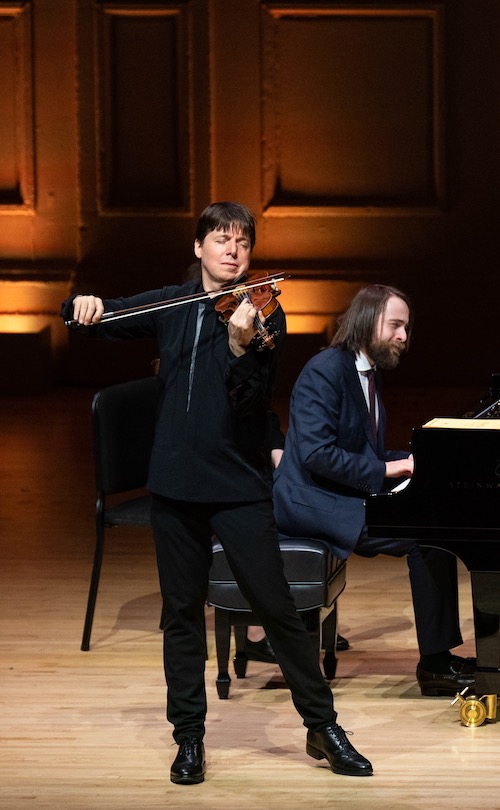Opposites attract as Bell & Trifonov make a characterful and complementary duo

Daniil Trifonov and Joshua Bell performed Tuesday night at Symphony Hall for the Celebrity Series. Photo: Robert Torres/CS
Not every chamber event can pack Symphony Hall on a Tuesday night in April. Then again, not every such program consists of violinist Joshua Bell and pianist Daniil Trifonov. The duo’s spring tour, which is intermittently making its way across the United States, arrived in Boston last night, courtesy of the Celebrity Series.
Both artists are bona fide Romantics with all the benefits and pitfalls that entails. Bell, now in his mid-50s, remains one of the most charismatic fiddlers on the scene, though sometimes his performances follow the spirit of the music at the expense of the letter of the score. The danger of the 32-year-old Trifonov’s wizardly way with his instrument, too, is that interpretations sometimes get lost in themselves.
Tuesday night’s big question, then, wasn’t so much whether the pairing would find common interpretive ground in their program of pieces by Ludwig van Beethoven, Sergei Prokofiev, Ernest Bloch, and César Franck. Rather, the more pressing issue was when that might happen and for how long their simpatico might last.
In the end, one needn’t have worried: from at least the middle of Beethoven’s D-major Sonata Op. 12, no. 1, the duo was clearly on the same expressive page. While this earliest of the composer’s ten violin sonatas doesn’t reach as far or dig so deep as subsequent efforts, it’s a piece that brims with assurance and character.
Bell and Trifonov offered those qualities in spades–and, to start, in their own ways. In the first movement, for instance, the violinist imbued his line with sweet, soaring warmth. Meanwhile, Trifonov drew out an understated array of dynamics, articulations, and colors from the involved keyboard part. Exchanges of thematic ideas were collegial and relaxed rather than competitive or aggressive.
In the Andante, though, the tables turned, especially during the minor-key variation in which Bell and Trifonov mined the stormy turns with agreeable fury. Similarly gripping was their take on the wildly shifting moods in the Rondo. On Tuesday, what often comes across as a genial, late-Classical effort sounded uncommonly restless–even, at times, demoniacal.
Those latter qualities also emerged in Prokofiev’s haunting Violin Sonata No. 1. Written over the course of World War II and completed in 1946, the score’s hard edges are balanced by moments of brittle tenderness and heartrending vulnerability.
Last night, those extremes were painted viscerally. Trifonov’s account of his part was voiced with breathtaking clarity. As a result, the music’s knotty dissonances–especially the clangorous apexes of the second and fourth movements–were faultlessly placed.
But the quieter, poetic spots spoke potently, too. The tolling bell-like figures in the outer movements were beautifully resonant, as were the warmly flickering accompaniments in the Andante.
Around all this, Bell wove a duskily lyrical tapestry. The violinist was fully in his element, capturing the sonata’s songful side as well as its slashing, rough-hewn aspect. Perhaps nowhere was this more satisfyingly demonstrated than in the Allegro brusco, with its blend of unrelentingly vehement gestures and passionate melodic writing.
That last quality also emerged in Bloch’s “Nigun” (from Baal Shem) and Franck’s Sonata in A major, both of which came after intermission.
In the former, the duo delivered a reading of rhetorical fervor and stirring mellifluousness: both players were intensely matched in rhythmic tautness and articulative unanimity. The result was a performance of Bloch’s paean to his Jewish heritage that was about as moving–and, a night before Passover begins, fitting–as they come.
The pair’s Franck was similarly distinguished. Written as a wedding present for the virtuoso Eugène Ysaÿe in 1886 (“better than a toaster,” Bell quipped in his spoken introduction to the piece), the sonata’s four movements make heroic demands on the violinist and ferocious ones on the pianist.
So it’s not dinging Bell to say that the great thrill of last night was hearing Trifonov playing the daylights out of the Franck’s keyboard part. Surely this “accompaniment” has rarely possessed the orchestral sweep or sheer range of colors and voicings that were on offer Tuesday.
That said, Bell’s take on the violin writing–singing, impassioned, well-directed, smartly phrased–was a thing unto itself. A few questionable slides notwithstanding, Tuesday’s Franck was tight from start to finish, by turns tempestuous (the stratospheric sul G passagework in the Allegro was thrilling) and dreamlike (textures in the Fantasia were crystalline).
It was also compellingly sculpted. Indeed, by the time the finale’s radiant apotheosis arrived, there was a true sense of release, helped in no small part by the duo’s close attention to the sonata’s wide dynamic range.
Called back for multiple bows, Bell and Trifonov offered two encores: Clara Schumann’s winsome Romance and Johannes Brahms’ Hungarian Dance No. 1. Here, as throughout the night, the pairing was entirely–and gloriously–in their element.
Beatrice Rana plays music by Bach, Debussy, and Beethoven 8 p.m. April 14 at Jordan Hall. celebrityseries.org
Posted in Performances